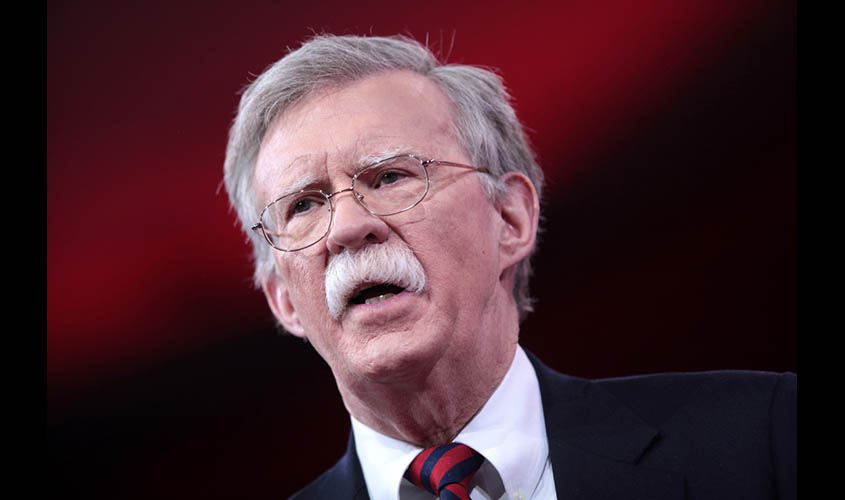Bolton is so well known in the political circuit that there is no shortage of descriptions available: ‘the neocon of neocons’; ‘aggressive and ruthless’, and many others.
The resident circus in Washington, otherwise known as the White House, has just signed a new attraction. John Bolton, the walrus-looking big beast from the Fox News jungle, is the new National Security Advisor. It remains to be seen if this addition to the cast can be tamed by the ring-master, Donald Trump, as precedence reveals little confidence. Bolton follows the departure of three-star General McMaster, who in turn had replaced Michael Flynn, who had lasted all of 22 days in the post. Among other reasons, Trump had complained that McMaster was “too rigid” and that his briefings “go on for too long and seem irrelevant”. Clearly, McMaster, who holds a PhD in history, was too cerebral for Trump. He was also known as someone who “spoke the truth, sometimes impetuously, with a distinct lack of talent for dissembling”, so it’s not difficult to understand why his tenure in the White House was inevitably going to be short. He is not alone. After just 14 months into the Trump presidency, no less than 48% of the top team in the White House has either been fired, resigned or moved on to other jobs. By comparison, after a full two years, President Barack Obama’s turnover was just 24%, and that of President George W. Bush’s was 33%.
But what of the new National Security Advisor? Bolton is so well known on the political circuit in Washington that there is no shortage of descriptions available: “the neocon of neocons”; “aggressive and ruthless”; “abrasive and hawkish”. He has also not been short of criticism of Trump in the past. During the election campaign in 2016 Trump said he would decide whether to come to the aid of NATO countries “in the event of a Russian attack, only after reviewing whether those nations have fulfilled their obligation to us”. Ridiculing Trump, Bolton said, “if he waits and does a review after they’re attacked, they’re in deep trouble. He’s practically inviting attack.
If I were Vladimir Putin reading this, I’d say the coast is clear!” He added that “it is possible that Trump is not fully cognisant of the weight his words carry when he speaks bluntly on such delicate international affairs, or that he might be wise to listen to different foreign-policy advisors.” Guess who. Somewhat contradictorily, his views on the State Department are also troubling. “State careerists are schooled in accommodation and compromise with foreigners, rather than aggressive advocacy of US interests, which might inconveniently disrupt the serenity of diplomatic exchanges, not to mention dinner parties and receptions”, he wrote in his memoire Surrender is Not an Option. MEA, take note!
But it is Bolton’s views on North Korea which are the most troubling. Writing in the Wall Street Journal only a month ago under the title “The Legal Case for Striking North Korea First”, Bolton argued for a pre-emptive strike against Pyongyang, emphasising that the threat is imminent. “Pre-emption opponents argue that action is not justified because Pyongyang does not constitute an imminent threat. They are wrong. The threat is imminent and the case against pre-emption rests on the misinterpretation of a standard that derives from pre-nuclear, pre-ballistic-missiles times. Given the gaps in US intelligence about North Korea, we should not wait until the very last minute.
That would risk striking after the North has deliverable nuclear weapons, a much more dangerous situation.” He concludes, “It is perfectly legitimate for the United States to respond to the current ‘necessity’ (sic) posed by North Korea’s nuclear weapons by striking first.” Shortly after Trump announced that he would be holding talks with Kim Jong Un in May this year, the sceptical Bolton poured cold water on the meeting saying, “They want to buy time; three months, six months, twelve months—whatever it is they need to get across the finish line.” Quite how Trump squares this circle with his new security adviser remains to be seen.
On Iran, Bolton’s views on “the deal” are more akin to Trump’s. Writing in the National Review on 28 August 2017 he argued that Trump should not wait for the next certification deadline in October (which Trump did in fact sign); instead he should “free America from this execrable deal at the earliest opportunity”. Recognising that partners such as Israel would need to be protected from nuclear proliferation and terrorist threats, Bolton proposed providing them with further F-35s and THAAD anti-air protection. He also recommended the expedition of the delivery of bunker-buster bombs.
This might worry you enough, but take a look at what Bolton said about Iran in March 2015, just before John Kerry, Barack Obama’s Secretary of State, successfully negotiated a non-proliferation deal that saw Iran agreeing to reduce its enriched uranium stockpile by 98% and a 15-year pause in key weapons infrastructure. Writing in the New York Times under the extraordinary heading “To Stop Iran’s Bomb, Bomb Iran”, he argued that “the inescapable conclusion is that Iran will not negotiate away its nuclear program, nor will sanctions block its building a broad and deep weapons infrastructure. Time is terribly short, but a strike can still succeed.”
Mercifully, Bolton is not in an executive role, although he will be an extremely powerful voice in the ear of President Trump. If he is the “last person in the room” before Trump makes a decision on Iran or North Korea, I shall be looking to buy a small island in the middle of the Pacific Ocean, where I can retire in safety.

